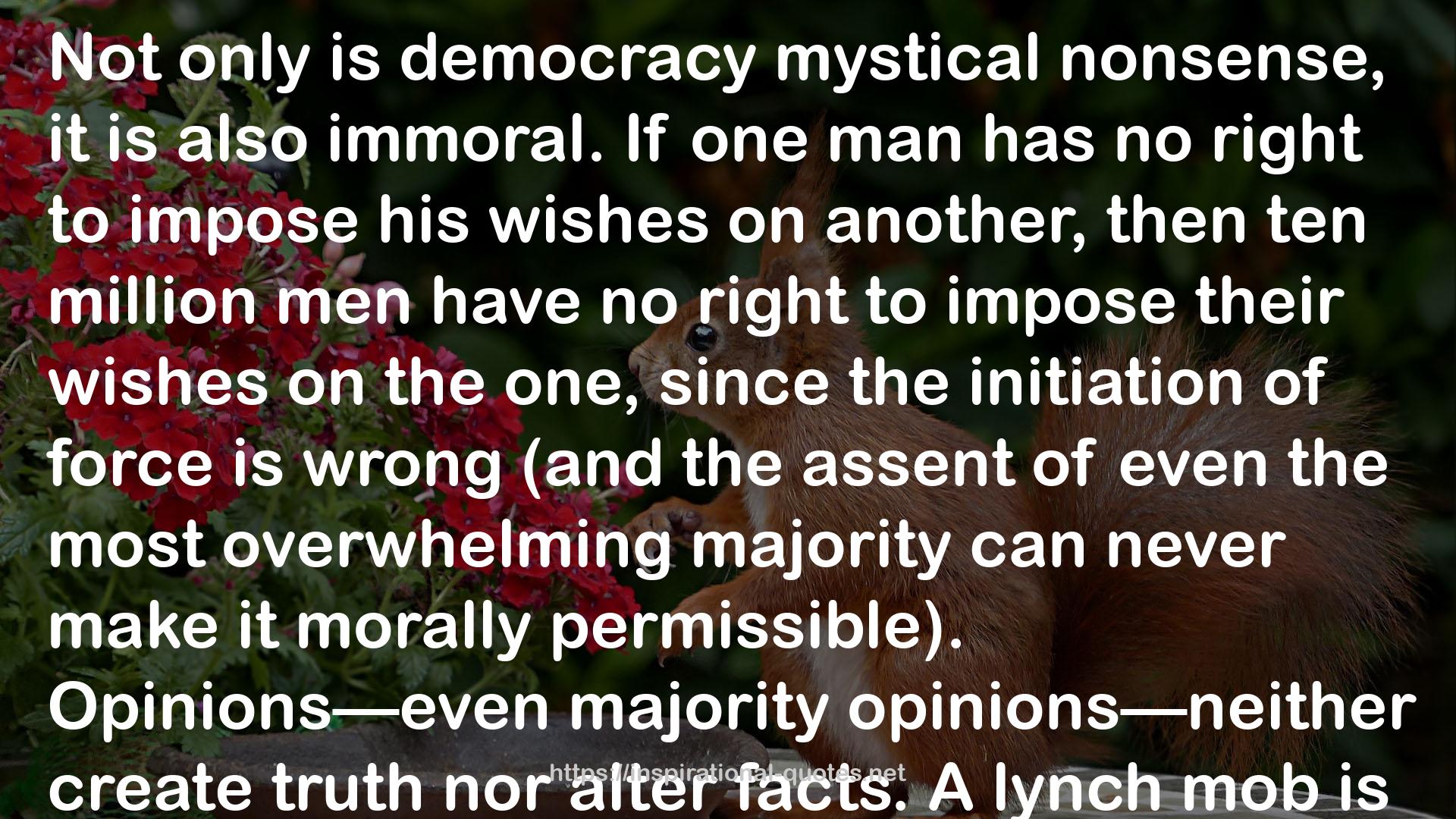3
" One of the most important considerations raised in connection with the abolition of government is what should be done with government wealth and property. As far as monetary wealth goes, this is no problem ... since the government doesn’t have any (as a look at the national debt figures will show). The government does, however, possess a tremendous amount and variety of “property” in the form of land, buildings, roads, military installations, schools, businesses such as the Post Office, Government Printing Office, and hundreds less well-known, prisons, libraries, etc., etc. Though these items are in the temporary possession of whatever bureaucrats happen to be in charge of them, they are not actually owned by anyone. “The public” is unable to own them, since nothing can be owned by a collective myth like “the people.” Politicians and bureaucrats don’t own them for the same reason that a thief doesn’t rightfully own the property he has stolen. “Public property” is actually unowned potential property. Since valuables in the possession of government are not actually owned, it would be perfectly proper for anyone to take possession of any piece of “public property” at any time that the government became too weak or careless to prevent him from doing so. The man who took possession of a piece of former “public property,” claiming it and marking it as his own for all to see, would become the rightful owner of that property. "
― , The Market for Liberty
7
" Although such an organized criminal gang may enter into many fields, organized crime finds its basic support in black market activities. A black market is any area of the market which is legally prohibited. If left unprohibited, it would be an area of trade involving peaceful, willing exchanges between sellers and buyers. But when government initiates force by forbidding this area of trade to honest men, it throws it open to men who are willing to take the risk of violating bureaucratic dictates and the statutory laws of the politicians. The violence and fraud associated with any black market do not spring from the nature of the good or service being sold; they are a direct result of the fact that entrepreneurs have been legally forbidden to deal in this area of the market, leaving it open to men who dare to ignore prohibitions and who are willing to resort to violence in order to do business without getting caught. Unless prohibited, every market activity is operated on the basis of willing exchange, without the initiation of force, because this is the only way a business can be operated successfully, as force is a nonproductive expenditure of energy. "
― , The Market for Liberty
15
" Picture a small South American dictatorship, weakened by economic stresses and a popular demand for more freedom, resulting from the existence of a laissez-faire society nearby. What would the dictator of such a country do if faced by a large and powerful insurance company and its defense service (or even a coalition of such companies) demanding that he remove all taxes, trade restrictions, and other economic aggressions from, say, a mining firm protected by the insurance company? If the dictator refuses the demand, he faces an armed confrontation which will surely oust him from his comfortable position of rule. His own people are restless and ready to revolt at any excuse. Other nations have their hands full with similar problems and are not eager to invite more trouble by supporting his little dictatorship. Besides this, the insurance company, which doesn’t recognize the validity of governments, has declared that in the event of aggression against its insured it will demand reparations payments, not from the country as a whole, but from every individual directly responsible for directing and carrying out the aggression. The dictator hesitates to take such an awful chance, and he knows that his officers and soldiers will be very reluctant to carry out his order. Even worse, he can’t arouse the populace against the insurance company by urging them to defend themselves—the insurance company poses no threat to them. A dictator in such a precarious position would be strongly tempted to give in to the insurance company’s demands in order to salvage what he could (as the managers of the insurance company were sure he would before they undertook the contract with the mining firm). But even giving in will not save the dictator’s government for long As soon as the insurance company can enforce noninterference with the mining company, it has created an enclave of free territory within the dictatorship. When it becomes evident that the insurance company can make good its offer of protection from the government, numerous businesses and individuals, both those from the laissez-faire society and citizens of the dictatorship, will rush to buy similar protection (a lucrative spurt of sales foreseen by the insurance company when it took its original action). At this point, it is only a matter of time until the government crumbles from lack of money and support, and the whole country becomes a free area. In this manner, the original laissez-faire society, as soon as its insurance companies and defense agencies became strong enough, would generate new laissez-faire societies in locations all over the world. These new free areas, as free trade made them economically stronger, would give liberty a tremendously broadened base from which to operate and would help prevent the possibility that freedom could be wiped out by a successful sneak attack against the original laissez-faire society. As the world-wide, interconnected free market thus formed became stronger and the governments of the world became more tyrannical and chaotic, it would be possible for insurance companies and defense agencies to create free enclaves within more and more nations, a sales opportunity which they would be quick to take advantage of. "
― , The Market for Liberty

